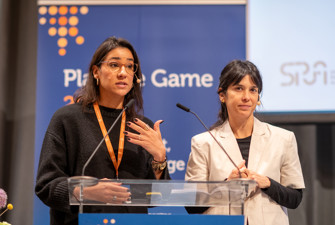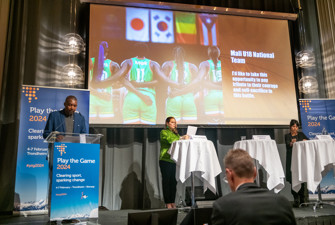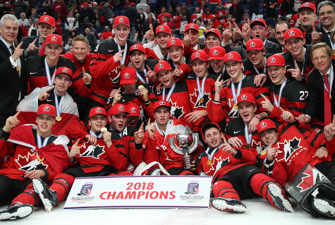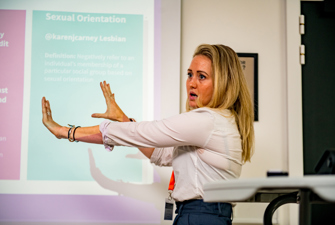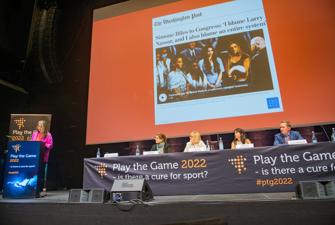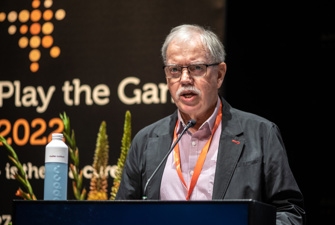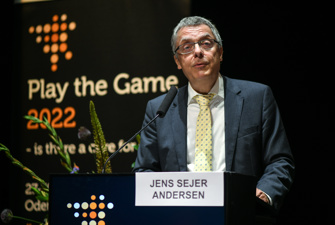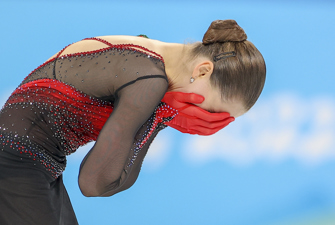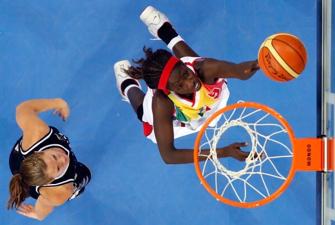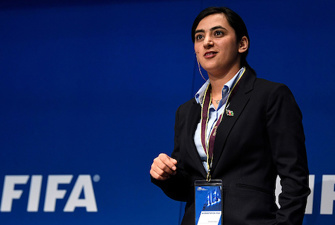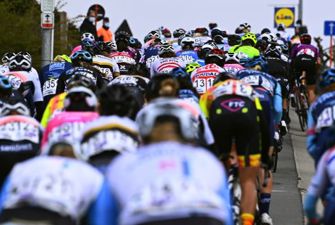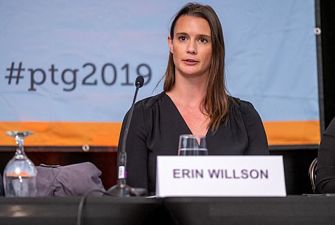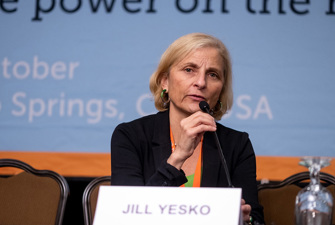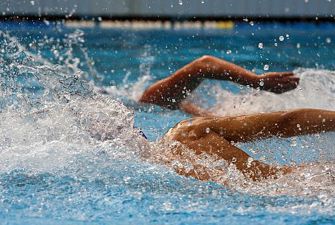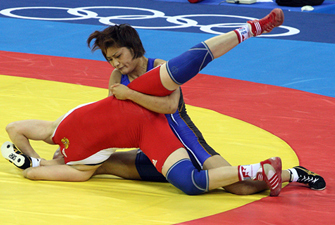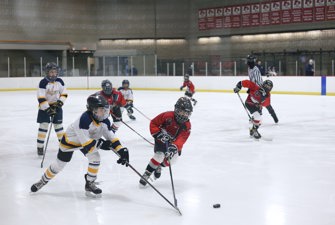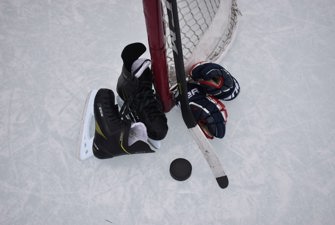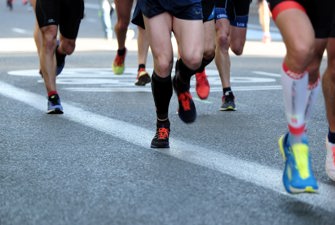Crossing the Line: Violence and Sexual Assualt in Canada's National Sport
Writing the book "Crossing the Line: Violence and Sexual Assault in Canada's National Sport" was a six year journey for journalist Laura Robinson. Here she recounts the story of how she exposed a rape culture in junior hockey and how she has been deeply affected by the story.
It started in the summer of 1992 while I was doing a story on a white supremacist killing in Northern Saskatchewan. My best informant told me if I wanted to really do a story I should go to Swift Current (in Southern Saskatchewan) because, "some hockey players had raped a girl and got away with it." All his leads had been good ones in terms of the murder, so I thought I would follow up on the rape story.
I am a Toronto based journalist and wasnt able to get to Swift Current until January 1993. At that time the girl who had alleged the rape was just getting out of counseling.
I interviewed her lawyer, the investigating officer, the minister from her church, and the hockey coach of the team. His name was Graham James. I remember thinking at the time that he was very careless with his words while talking to a journalist. He used the word "fuck" more than once to describe how easy it was for his players to have sex with young girls. Then he compared this to the NHL:
"I know of guys who have hundreds of names of women they could phone up in every major-league city. I went out with a friend in a bar, and at least thirty girls would have done anything to him. I doubt there's a whole lot of passion involved. In the change-room they don't have respect for girls. They spend hours talking about their girlfriends, but they don't like the girls at the rink."
When I investigated I found discrepancies in the way in which the justice system had handled this case. Charges were first laid against two players on October 3, 1989. Then the investigating officer, who had been trained in investigating sexual assault was taken off the case. An "interrogator" who had not been trained in sexual assault investigations was put on it.
The guidance counselor at the high-school attended by the girl and the players was the wife of the major owner of the team. She took the girl into her office and told her that the players, "were good boys, they wouldnt do this. Drop the charges." (She denies saying this).
This womans name is Colleen McBean. She is married to Frank McBean, who is not only one of the teams owners and a "pillar" of the Western Hockey League, but also the former law partner of the Crown Attorney who was supposed to be prosecuting the players.
Cover-up in Saskatchewan
I'm not trying to say that girls who don't fit the description of this girl aren't innocent when they report a rape, but the girl who alleged the rape had just turned seventeen, went to church every Sunday, was a virgin, and had learning disabilities.
She was taken to a room at the police station and interrogated for over two hours on November 1, 1989 with no counsel or parents present. Finally she said, "Maybe I didn't say no." The charges against the players were immediately stayed, and public mischief charges were laid against her.
Meanwhile the two players had been traded to a team two time zones away. Their names are Wade Smith and Brian Sakic.
The trial took place in January 1990. The players agreed that they had done everything to the girl that she described, which included penetration in three orifices, and admitted that "there had been blood." In fact, she bled heavily the night of the alleged rape and continued to bleed intermittently for the next two days. They said she begged for more. The girl said she begged them to stop and was terrified.
Presiding Judge Harding found the girl not guilty and wrote that as a result of the "degrading and disgusting" incident, the girl "suffered considerable physical and emotional pain. That's not sympathy. That's fact. It became clear to her that [the hockey players] had no feelings at all for her and had merely used her for their own sexual gratification.She honestly believed that what happened to her was not by consent."
Despite showing in a court of law that there was no basis for the public mischief charges, but considerable basis for the sexual assault charges against the players, the charges against them were dropped. The players continued to play for teams in another province, and their team, the Swift Current Broncoswas, was awarded Team of the Year by the province of Saskatchewan.
Murray Walter, who represented the girl, requested to the provincial Justice Department that an inquiry into the case be held. His request was denied. At the time Saskatchewan was under the Conservative government.
Rape as re-enactment of initiation abuse
I spent more time in Swift Current, trying to understand how this could have possibly happened. I could understand how a rape could happen, but how could such a travesty of justice happen? The initial investigating officer, Ian McLean, told me it was very important for this story to be told. "I have to live here and I can't do anymore," he explained, "but you have to tell this story."
I wondered if Swift Current was just a really sick, but isolated hockey town, or if what I had investigated was systemic to the culture of junior hockey.
After five more years of investigation, it was clear that junior hockey had what sport sociologists call a "rape culture." It wasn't difficult to find more junior hockey teams that had been charged with sexual assault. In all but one case, gang rape was alleged. What was difficult was getting anyone in the hockey establishment to talk about this phenomena, or any convictions.
There were a lot of pieces to the puzzle but they weren't going together yet. And then, I happened to read a very small item in the Toronto Star Sports Section on March 1, 1994. One hundred and thirty-five sex crime charges had been laid against the senior players, owners, coaches, and trainers of the Tilbury Hawks, a Junior C hockey team in Southern Ontario after a player went to the police.
The team had held an initiation for their rookie players. When I read the police description of what had been done to the boys and interviewed the player who had gone to the police, I realized they had been subjected to pure sado-masochism.
There was a litany of "games" performed on the players, one of which occurred when the trainer for the team put marshmallows up the boys' rectums. The game consisted of them pushing the marshmallow out. Whoever got theirs out last had to eat the other contestants' marshmallows. This was just one of the many "games" that centred on the boys rectums, penises, or mouths.
I was digging into a rather horrific area for over a year now, but at least it was starting to make sense. I consulted with sexual abuse experts who explained that victims, particularly boys, desperately want to get rid of what they call "the bad feeling" they have from abuse. They are also very angry and frustrated with the powerlessness they feel, especially when they have been abused by men they looked up to and trusted. One of the ways they believe they will get rid of these bad feelings is to transfer them to someone else. They frequently mimicked the abuse they suffered onto another victim.
I talked to more girls in Swift Current. It turned out the girl described above was not the only one who had very disturbing sexual encounters with hockey players. She was the only one who had gone to police. After seeing what happened to her, girls did not have confidence in the justice system.
Now I was starting to understand why the gang rape cases I investigated involved anal penetration of the girls as well as vaginal and oral. The hockey players were re-enacting, I believed, what had happened to them during initiations.
As I mentioned earlier, all but one case involved alleged gang rape. We are talking about teen-agers, people who have yet to develop a mature sexual self. In the case of the girls, some were very young: twelve and thirteen. The alleged gang rapes and initiations were violent, degrading, humiliating, and in a group. The initiations and the gang rapes were very similar to each other.
The decision to change to television
I was doing this investigation for Saturday Night Magazine, one of the oldest and most respected journals in Canada. They had backed me as the story kept getting larger and larger. But a new Editor-in-Chief took over.
His name is Ken White, and he had at one time been a sports reporter for the Lethbridge Herald in Alberta. By this time, I could have done yet another story - this time on the Lethbridge Hurricaines. In total I had at least twelve case studies to back up the main stories I had done for the magazine.
The story was supposed to run in April 1994, but Mr. White wanted re-writes. He wanted proof that what I had uncovered was a recognized phenomena amongst sports teams.
No one in Canada had yet done a study to see if hockey teams had a greater propensity towards rape, both within the team, or as a team. But sport sociologists in the United States had commenced studies on NCAA football and basketball teams, and found that female students had alleged much higher number of sexual assaults by these athletes than by male athletes from other sports, and than non-athletic men. This study was written up in a peer-reviewed journal and was eventually published in book form.
For some reason, Mr. White was not satisfied with this information and continued not to publish the piece. I re-wrote and re-wrote, but nothing seemed to work for him Finally, in the fall of 1995, I refused to do another re-write and went the CBC TVs the fifth estate.
We had worked on a documentary three years earlier on male coaches and the sexual abuse of female athletes. At that time they told me they wanted the junior hockey story if things didn't work out with Saturday Night Magazine. We started working on the documentary, but in January of 1996, my mother died of cancer. It had always been very difficult to nurse her for the three years she was ill and investigate this very disturbing situation in hockey. Unfortunately, I was unable to stop working on the piece, and continued almost immediately after her death.
We shot the documentary that winter and spring and it aired in the fall of 1996.
After the piece went to air, Don Cherry, who hosts Coach's Corner also on CBC TV, denounced the piece as "tabloid journalism." He looked at the camera and declared, "Mom, dad you have no reason to think that junior hockey isn't safe for your son."
Within the same week Graham James, the coach I had interviewed back in Swift Current in 1993, had been charged with 350 counts of sexual assault after two players went to the police. He had been one of Cherry's golfing buddies and was declared Man of the Year by Hockey News in 1989.
Hockey's dirty secret was out
The next six months were like no other in Canada. The sacred sport of hockey had a dirty secret.
In January 1997, Sheldon Kennedy, the NHL player who broke the silence on James, went public. The story received huge coverage on the front pages, and multiple sport pages of all the dailies. It led as the first story in the electronic press for several days.
Then in March 1997, Martin Kruze, a man in his thirties who lived in Toronto, came forward about a pedophile ring that had existed at Maple Leaf Gardens for years. He alleged that he and dozens of other boys had been abused for years and that Maple Leaf management had covered it up and paid him off. Fifty-one victims gave testimony at the ensuing criminal trial. When one of the perpetrators received a short two year sentence, Kruze committed suicide.
Other former NHL players also started to speak publicly. They said they had been sexually abused by Brian Shaw, former owner and general manager of the Portland Winterhawks, another CHL team. When players requested a transfer from the team, they said Shaw would sabotage their efforts.
Getting the story out in a book
By this time, I had signed a book deal with McClelland & Stewart Publishers. I went to the Banff Centre for the Arts to write the book, which is located in the Rocky Mountains. I knew the subject matter was so distasteful, I knew I had to get away from the story on my skis as often as possible. Alberta sees much more sunlight than does Toronto in the winter, and I knew this was important too. I shipped 110 pounds of files to Banff.
The final draft was done by December 1997 in Toronto. At this point it went to the publishers lawyers' with an expected release date of spring 1998.
Unfortunately, the lawyer for M&S found much he didn't want in the book. Mainly he took exception to printing the names and locations of teams and individuals that had been involved in sexual assaults and either charges had been dropped or an acquittal had occurred.
Leading up to and during the trials, teams and players had been named in the media. I was only writing about cases that were already in the public domain. This included the Swift Current Broncos case. I wanted to show that the 1989 alleged rape (that never did go to trial because of what I believe to be a cover-up) was part of the larger picture in Swift Current.
By then I had ten young women in Swift Current who told me about the abuse they suffered at the hands of the players. One player admitted that James paid them to have sex with girls while he secretly video-taped it. One girl wanted me to use her story, but even with names changed she asked that I take it out. "If he finds out I told you about what he did he'll come back and kill me," she said. This player was then playing in the AHL.
I believed that once the Canadian public understood the relationship between the 1989 alleged rape and the sexual assaults committed by coach Graham James on the players that they would be able to see a pattern, a cycle of violence and sexual abuse that was indicative of the "rape culture" of junior hockey.
Unfortunately, with so many individual names, team names, and team locations removed from the book, people could not put together what was the essential thesis of the book. I was very disappointed in this editorial decision.
My publisher gave me a very good book tour and Crossing the Line sold well, but I noticed that every time M&S advertised their hockey books in newspapers, mine was missing. They didn't line up any readings for me to do in Toronto, and in fact soon would be coming out with an "autobiography" on Theo Fleury, one of the players Graham James coached who would only say, "Im not saying he sexually assaulted me, Im not saying he didn't."
Sheldon Kennedy had earlier stated that Fleury was on one of the California trips James and Kennedy had made when abuse occurred, and that James had come to his room only every other night. The Fleury book had no details about the Graham James era of abuse, nor did it give any explanation for Fleury's continual problem with drugs, alcohol, and violence.
I believe my publisher didn't really want to delve into the culture of abuse I had chronicled because it would upset the Canadian hockey myth to such an extent that the "hockey cheerleading" books that Canada publishes each year would be seen in a completely different light.
"Crossing the Line" was excerpted in Chatelaine, Canadas largest womens' magazine, and received a great deal of response, mainly from young women who had been raped by hockey players. It received a good review in The Globe and Mail and other newspapers across the country, but the national magazine MacLeans simply did not include it in their review of all hockey books that were released that fall. I called the writer in question, Anthony Smith, who is now the editor-in-chief, and left a message asking why he had overlooked my book. I did not receive a response.
Feeling responsible for other survivors
Meanwhile, a lot of abuse survivors who did read Crossing the Line contacted me. This was something I had not anticipated. Throughout my book tour, and up until today, survivors of sexual, emotional, and physical abuse seek me out and tell me their stories.
This role has been very difficult to take on. Most of these people have told no one of their abuse, or were not believed and consequently I became a bit of an oasis for them. I hadn't realized that, for them, I was telling their story.
The relationship they had with me was very intense. They had often come to a reading or had seen me on television, but I didn't know who they were. They had invested a great deal of emotional energy into the relationship they had with me. I cared, of course, about their emotional and physical state, but what was I to do? I am a writer, not a counselor.
Eventually I sought help because I started to feel so responsible for so many strangers well-being. I seemed to be absorbing an awful lot of pain. A counselor said to me, "You are responsive to people, but you are not responsible for them." This has helped a great deal. She also told me to find the yellow pages of each city I am speaking in and get the phone numbers of all the sexual assault centres so I can direct people to real professionals.
The costs of writing the book
Writing and researching "Crossing the Line" was one of the most difficult experiences I have ever had. I was twice denied media accreditation by the Canadian Hockey Association or Canadian Hockey League. It made me physically and emotionally ill, and seems to have permanently robbed me of a certain energy to really "attack" projects. I can't write into the morning hours anymore, and don't look forward to intricate, investigative stories that will take months or years of digging and stepping on important toes.
Half of me wants to cover the civil trial that will occur this spring when the second complainant in the Swift Current Broncos case and his parents sue the top brass in Canadian hockey. This young man, who was sexually assaulted more than fifty times by Graham James says, along with his parents, that the leadership in hockey "knew or should have known" that Graham James was a sexual predator.
I will be sitting in the same court room as the Canadian Hockey League and their western branch, the Western Hockey League. The last time I went to one of their press conferences, the Chief Executive Officer refused to answer any of my questions and slammed the door in my face. While I continue to have great respect for hockey as a sport, I cannot respect those who will be in the courtroom this spring and their blind belief that nothing is wrong with their sport.
On the other hand, some of the responses have been overwhelming. "I want to thank you from the bottom of my heart," wrote one young man. "I was seventeen when my hockey coach first got me. He got a lot of the other guys and they have lots of problems now. I keep telling them to read your book, but they won't. They can't face up to it yet."
A young woman came to my office at the University of Calgary when I was writer in residence there two years after "Crossing the Line" came out. She had written poetry about rape. The hockey team in her town had raped her. She loved reading the book and was inspired to tell her story. She is a very bright young woman who I believe will be telling real Canadian stories in the future.
In the First Nation language of Ojibway in North America, the definition of "the truth" is different from an English definition. In Ojibway it means, "As much as I know from the place I now stand." In the end, I believe "Crossing the Line" told a truth about Canadian hockey that most people find very difficult to hear. I am honoured that so many young people trusted me with their stories that contained so much pain and hurt, and that I was able to tell them.



